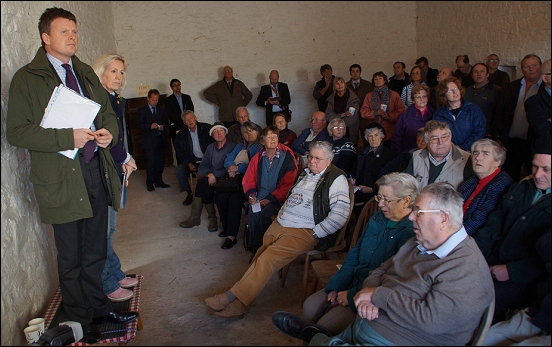More than 150 farmers, landowners, tenants and smallholders packed a barn near Wedmore to question Richard Benyon, Flooding Minister from the Department of Food and Rural Affairs (DEFRA).
Burnham’s MP, Tessa Munt, organised the event and was keen that the Flooding Minister should see the River Axe and Brue valleys so he could view the damage caused to land and businesses by flooding for himself.
After a tour of the area, Mr Benyon met local farmers who aired their concerns about the hardships they face after an extraordinarily wet 2012. They also made a number of suggestions and put forward solutions to improve the situation.
Many blamed more than a dozen years of neglect, pointing out that no dredging of the rivers or rhynes had been included in the regular maintenance programme, which would at least have allowed the watercourses across the Somerset Levels to work as they were designed to do two hundred years ago. As a consequence, much of the wildlife and habitats for which the Levels and Moors are reknowned was lost, as floodwater sat on the land for many weeks and months.
Tessa told Burnham-On-Sea.com: “This visit will have left Richard Benyon in no doubt as to what is needed to improve the farmers’ chances of making a living from the land. He appreciates changes are necessary, and has taken back to London a clear message for Defra from the farmers of Somerset.”
“We must look at ways of increasing the influence of local people in decisions which affect the rivers and rhynes, and ensure those who have knowledge – sometimes going back through the generations – of the best way to drain and manage our precious and unique low-lying farmland. Part of the short-term solution should be the reinstatement of dredging, so the floodwater does not lie on the land for weeks on end during the summer, causing so much damage.”
“The long-term solution for which I am campaigning is an extra statutory priority for the Environment Agency, which currently has responsibility for the Axe and Brue Rivers, to recognise and value productive land. Without this I can see the situation occurring again as the climate becomes ever more unpredictable.”







